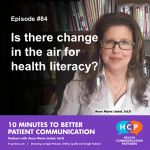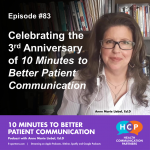Many of us have been conditioned, when things are difficult or …
Patient Education
Episode 84: Is change in the air for health literacy?
This health literacy month has been unlike any other. Listen to the latest …
[Read more...] about Episode 84: Is change in the air for health literacy?
Our podcast series turns 3 (and gets a new look)!
We have a reason to celebrate! Our podcast series "10 Minutes to Better …
[Read more...] about Our podcast series turns 3 (and gets a new look)!
Thoughts from the inaugural NPHIC + CDC Health Communication Marketing & Media Forum
Conference season is in full swing, and I am not minding these virual …
Ways & Means seeks input re: ‘the misuse of race within clinical care’
Last week, House Ways and Means Chairman Richard E. Neal followed up a series of …
[Read more...] about Ways & Means seeks input re: ‘the misuse of race within clinical care’
Why is House Ways and Means Chairman Neal writing to medical leaders?
House Ways and Means Chairman Richard E. Neal recently wrote a series of letters …
[Read more...] about Why is House Ways and Means Chairman Neal writing to medical leaders?






